According to the Prophet Isaiah, grass withers, flowers fade, but God’s word endures.
In the age of social media, so do the mistakes of church musicians.
Play the wrong chord, forget the words to a song or sing an off note, and a worship leader or singer may find themselves featured in Facebook videos or Instagram accounts like “Worship Fails” for years.
As a result, said Marc Jolicoeur, worship and creative pastor at Moncton Wesleyan Church in Moncton, New Brunswick, Canada, churches like his have paid more attention to how their music sounds online. That includes using Auto-Tune or other pitch-correcting software.
Widely used in the recording industry to smooth out the rough edges of vocalists, pitch correction has become fairly common in congregations.
Your tax-deductible gift helps our journalists report the truth and hold Christian leaders and organizations accountable. Give a gift of $30 or more to The Roys Report this month, and you will receive a copy of “Hurt and Healed by the Church” by Ryan George. To donate, click here.
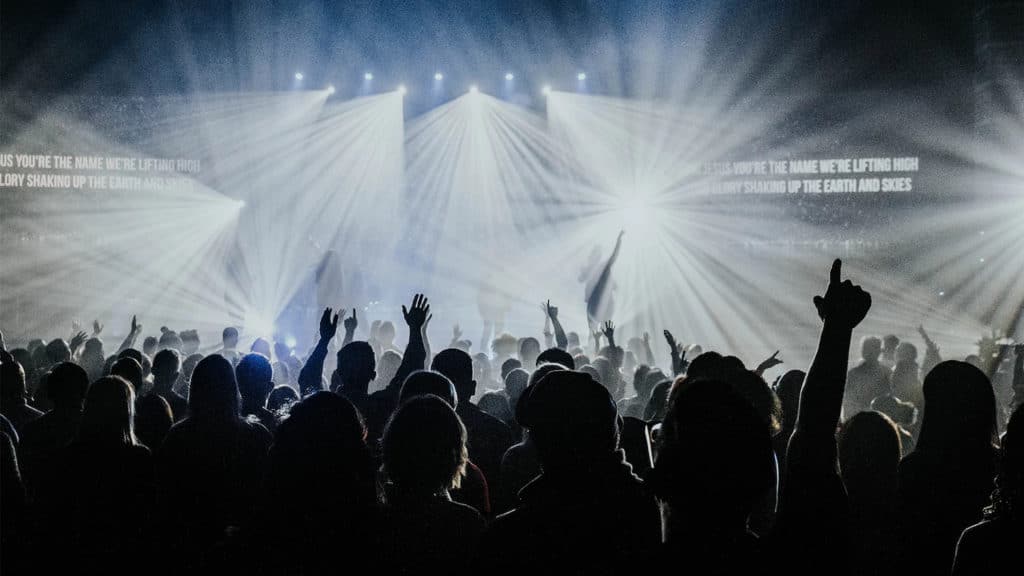
The pitch correction process feeds the sounds sung into a microphone into a processor that aligns the singer’s pitches with pure versions of the note.

In worship contexts, pitch correction makes it easier for less talented or less rehearsed singers to still help lead congregational singing, said Jolicoeur. If they make small mistakes, they can be corrected easily.
Churches are also more aware of hitting the right notes because their services are going out on livestreams. People attending a service in person, said Jolicoeur, often have a better experience — the congregation’s singing resounds in the actual church building; those at home only hear what’s going into microphones and coming out of their computer speakers.
A 2023 study of online worship from Pew Research found that while remote worshippers rate online sermons and sermons they hear in person about the same, there’s a drop-off when it comes to music. Sixty-nine percent of those surveyed said they were extremely satisfied or very satisfied with music at in-person services. That dropped to 54% for those who attended online.
Drew Small, a former megachurch audio engineer who now works in marketing, compared it to spell check for singers. Or the kind of bumpers used to help kids learn how to bowl.
“You still need to try and throw a strike,” he said. “But the bumpers help you from going into the gutter.”
COVID-19 also promoted the use of Auto-Tune because many church musicians found themselves suddenly in charge of producing services to be streamed online. That meant getting up to speed with the latest technology, such as pitch-tuning, which has become increasingly affordable for churches.
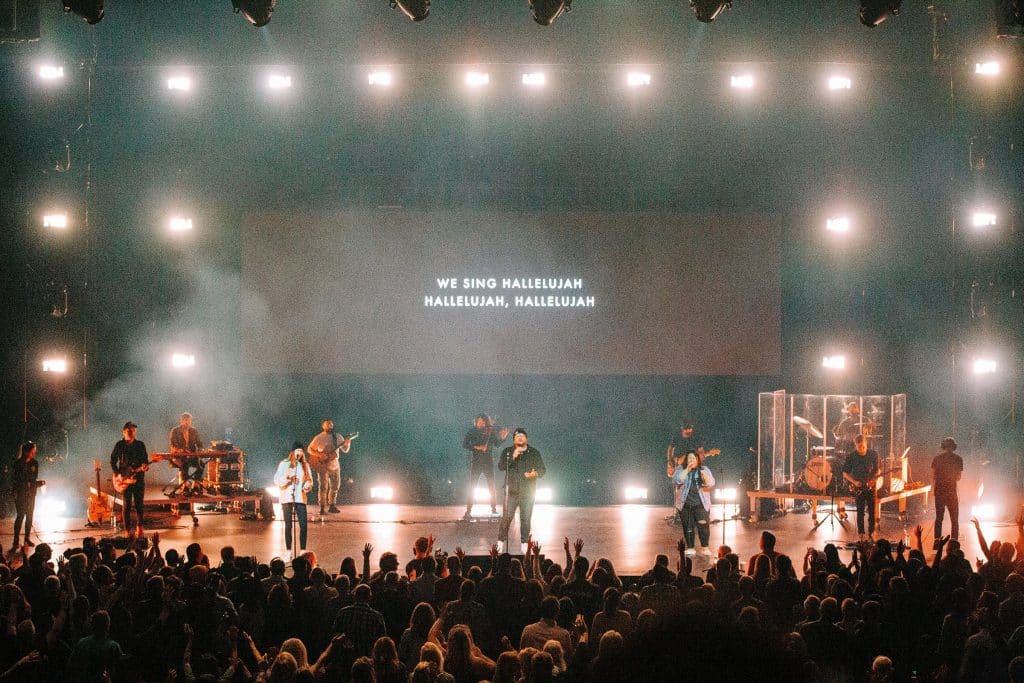
Small said he first became aware of Auto-Tune, developed by Antares Audio Technologies and introduced in 1997 — while working more than a decade ago as an engineer at Bethel Church in Redding, California, home to some of the most popular worship music used in congregations.
A group of musicians from another church singing at Bethel, he recalled, insisted that the church provide pitch correction for its singers during services.
“They didn’t want people’s worship experience to be hampered by a background vocalist who had a cold and couldn’t quite hit the notes or someone who sang a little flat,” he said.
At the time, said Small, he was working on broadcasting services and the church wanted to make sure it sanded the rough edges before the sound was sent out on the internet.
At first, using pitch correction during live services, Small said, gave him pause.
He came around because pitch correction allowed the church more flexibility in choosing singers and worship team members, knowing they didn’t have to give perfect performances every time. Since the church had multiple services, pitch correction also made it easier for singers to get through a weekend’s worth of services, even if they got tired, he said.
Small said he is well aware that pitch-tuning, which can make singers sound artificial, could backfire if overused.
“A good auto-tune is something you really never notice,” he said. “It wasn’t like we were trying to make someone be more talented than they actually are.”
Travis Ham, worship pastor at Bear Creek Bible Church near Fort Worth, Texas, said he was skeptical about using tuning tools for worship bands, such as an in-ear click-track, which helps musicians keep time during songs.
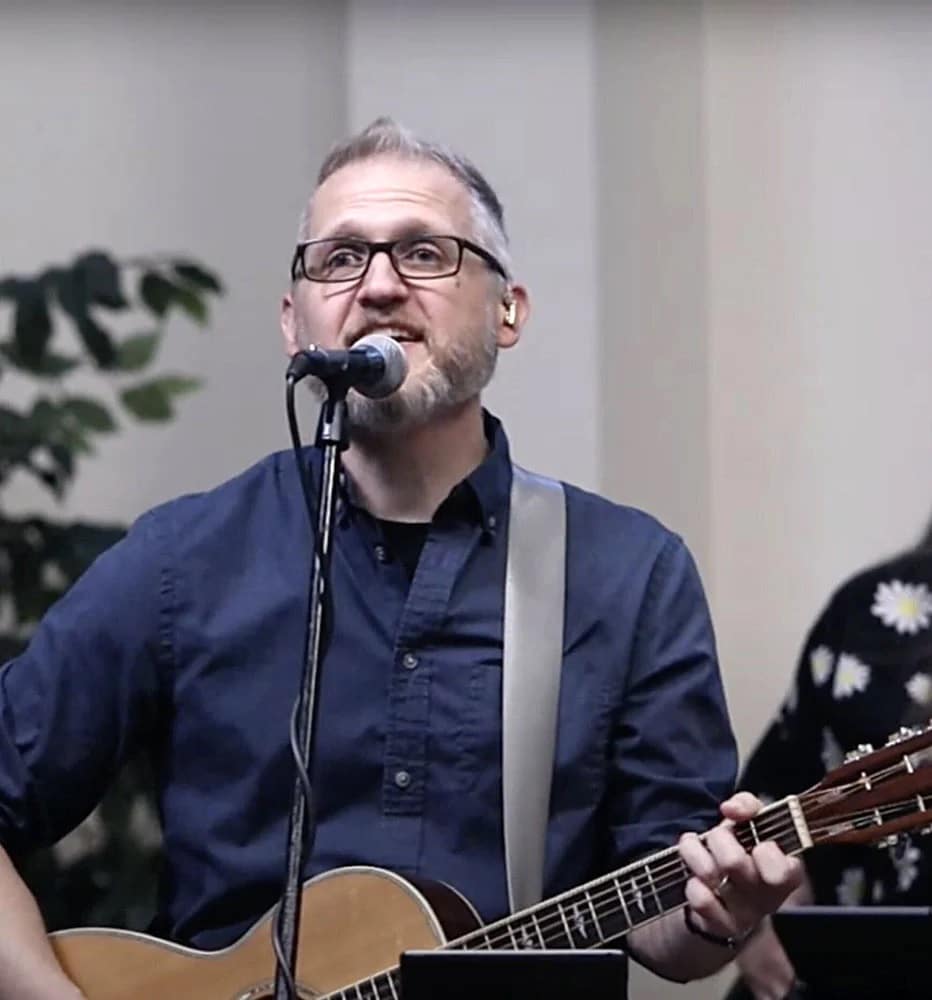
“It almost felt like cheating,” said Ham, who studied music at the University of North Texas.
Ham said he adopted a click-track after working with a volunteer drummer who had a tendency to speed up whenever the music got loud — a not uncommon occurrence. Using a click-track solved the problem and made the whole group play tighter. That success opened his mind about pitch-tuning.
The tools help “regular people who want to serve God,” he said, as part of the church’s worship team. Not everyone is convinced that using pitch-tuning is a good idea.
Ryan Flanigan, a longtime church musician who is now an artist in residence at Baylor University, worries that pitch-tuning is one more sign that church musicians are trying to aspire to be performers — rather than leading people in worship.
He said he spent years using all the latest tools to conjure one emotional experience after another — always looking for the next big things or trying to emulate popular megachurch worship bands. Then he gave up.
“Where does it end?” he said.
Flanigan, who records what he calls liturgical folk music, said he’s scaled back to a simpler approach. Being authentic, he said, means embracing imperfection.
Adam Perez, assistant professor of worship studies at Belmont University in Nashville, Tennessee, has similar concerns about worship leaders trying to be something they are not. He worries that churches will become “karaoke franchises” of megachurches.
“The more you can do to sound not like yourself and more like a recording has been a long contemporary worship issue,” he said.
In his classes, Perez said that he teaches his students about the latest technology and tries to inspire them to lead their churches to a more authentic style of worship — one that comes naturally from their churches rather than emulating someone else.
He also warns them about romanticizing the past, saying that there were problems even when people sang hymns without pitch correction or the latest technology. People sang too loud or too off-key or too fast—and probably could have used a little help.
“We are constantly trying to do this better,” he said.
 Bob Smietana is a national reporter for Religion News Service.
Bob Smietana is a national reporter for Religion News Service.





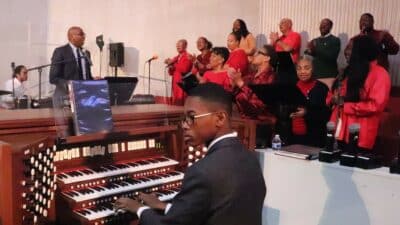







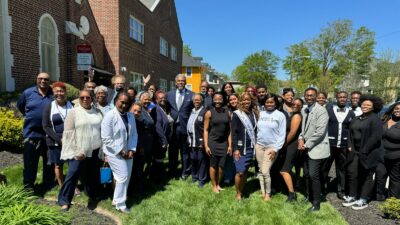






9 Responses
“They didn’t want people’s worship experience to be hampered by a background vocalist who had a cold and couldn’t quite hit the notes or someone who sang a little flat,” he said.
What can you say to this except, “Uh, sure,” or maybe, “Oy!”?
If a congregant is dissatisfied with the music, maybe he should volunteer to do it better.
Never mind Auto-Tune, how many Worship(TM) experiences are lip-synced with a Perfect-sounding Track?
Deception, Deceit, and Phoniness are the new Fruits of the Spirit.
There’s a whole theology behind “people’s worship experience” and its connection with an error-free musical performance.
Assuming the performers are sincere, it seems like a misplaced focus.
Sermons written by ChatGPT or preachers that use reference books instead of being “Spirit led.” We will always be somewhere in the scale between talent and inspiration. You could almost use the same argument for not using auto tune and other technical tools to argue against audition only choirs or back up singzrs.
I’m a board certified music therapist and a vocal instructor. Poor intonation is a symptom, not a cause. You can correct the pitch, but issues with breath pressure, vocal fold closure and resonator coupling remain. It can be in tune and still sound off! Spend some of that production budget to pay for some group lessons for your team, then work on growing a singing congregation! Feeling secure and supported by the singers around you helps everyone sound better while experiencing what it means lift every voice and worship with our whole selves.
Thank you for adding this helpful information. Training could be helpful in some situations. In the smallest of churches, though, there may not be the time or the budget for such training nor for Auto-Tune.
“….Spend some of that production budget to pay for some group lessons for your team, then work on growing a singing congregation!…”Such great advice! Also stop pushing pedestrian modern compositions onto the congratulations????.
At least when I’m on the Internet I can turn the sound off!????
As a life-long, serious and dedicated musician who practices daily on pitch-accuracy (for the glory of God), I adjure you in the name of the Lord, DO NOT call people musicians who need to use auto-tune technology.
The SIN is that this is not much better than lip-synching. As a life-long, serious and dedicated musician who practices daily on pitch-accuracy (for the glory of God), I adjure you in the name of the Lord, DO NOT call people musicians if they use auto-tune technology!